2021届中考复习 人教 一轮教材复习第6讲七年级下册Units 7~9课件40张
文档属性
| 名称 | 2021届中考复习 人教 一轮教材复习第6讲七年级下册Units 7~9课件40张 | 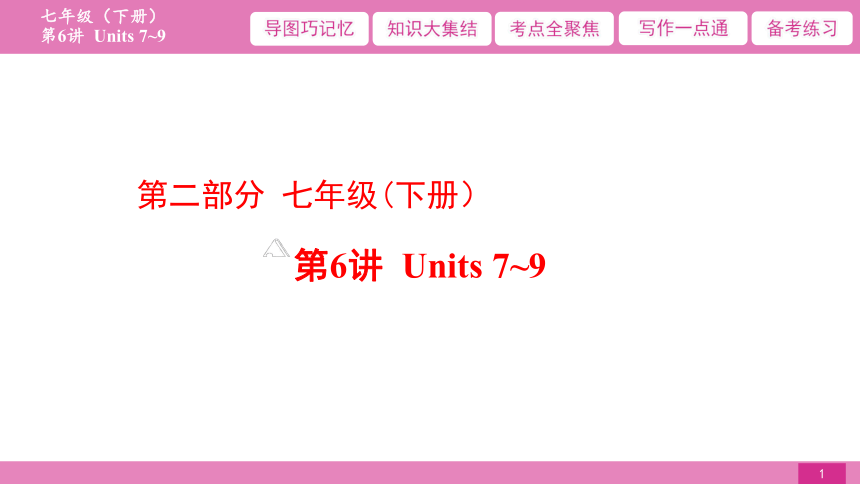 | |
| 格式 | pptx | ||
| 文件大小 | 911.7KB | ||
| 资源类型 | 教案 | ||
| 版本资源 | 人教新目标(Go for it)版 | ||
| 科目 | 英语 | ||
| 更新时间 | 2021-02-21 10:50:57 | ||
图片预览


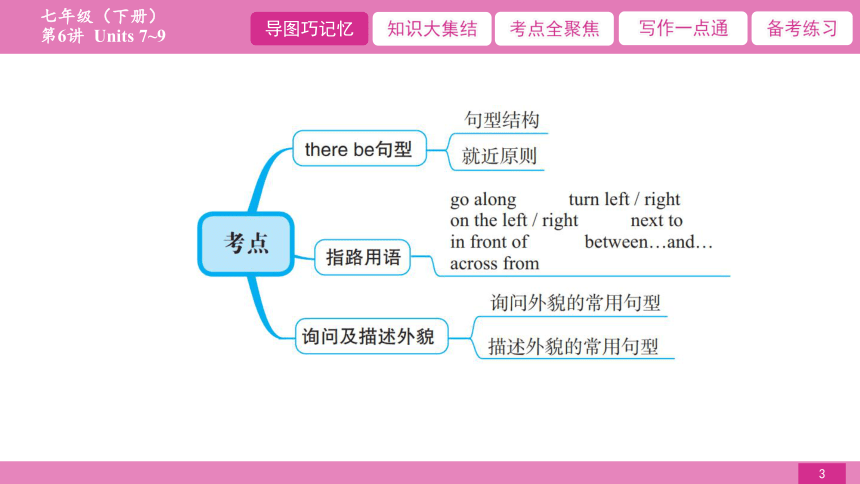

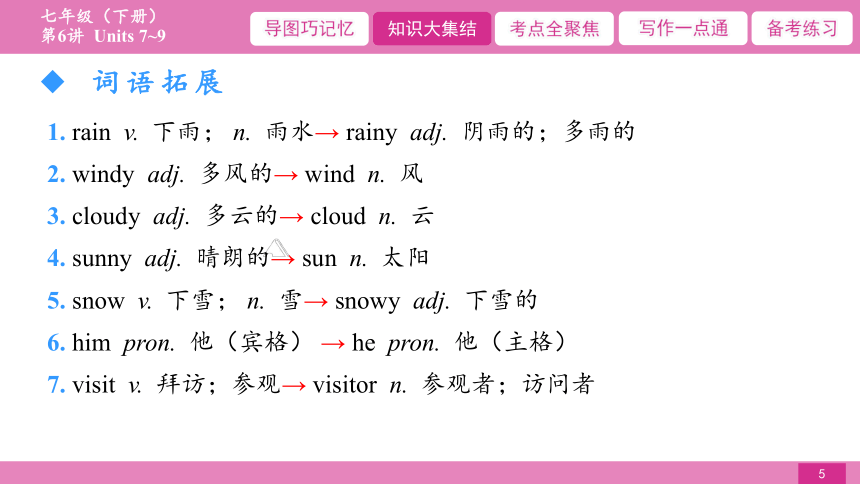
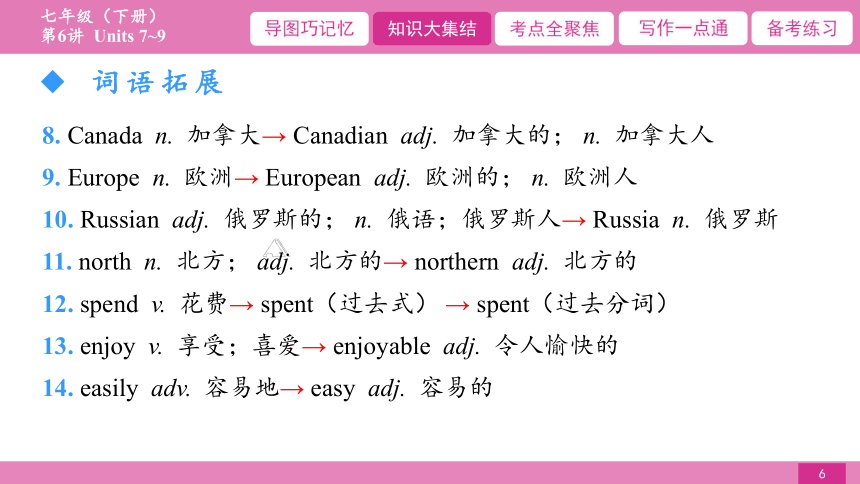
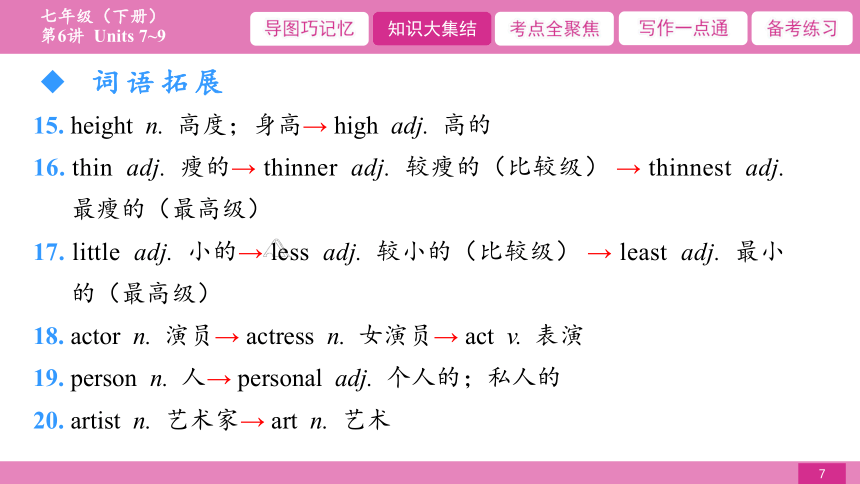
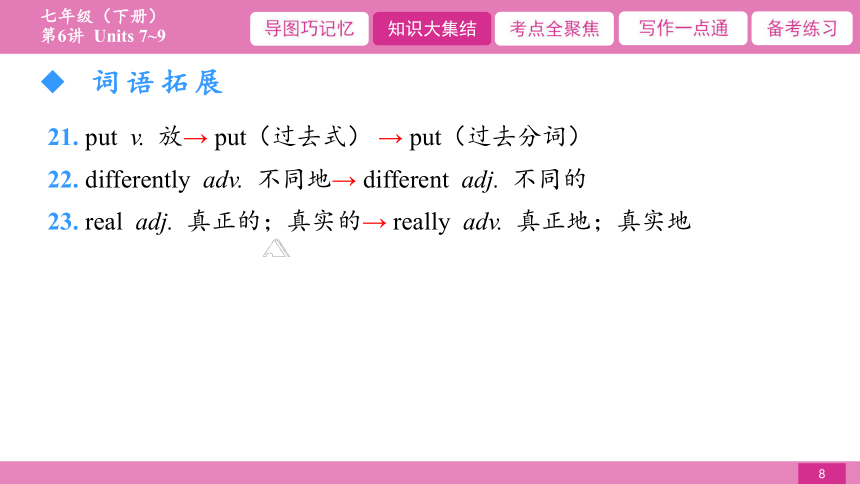
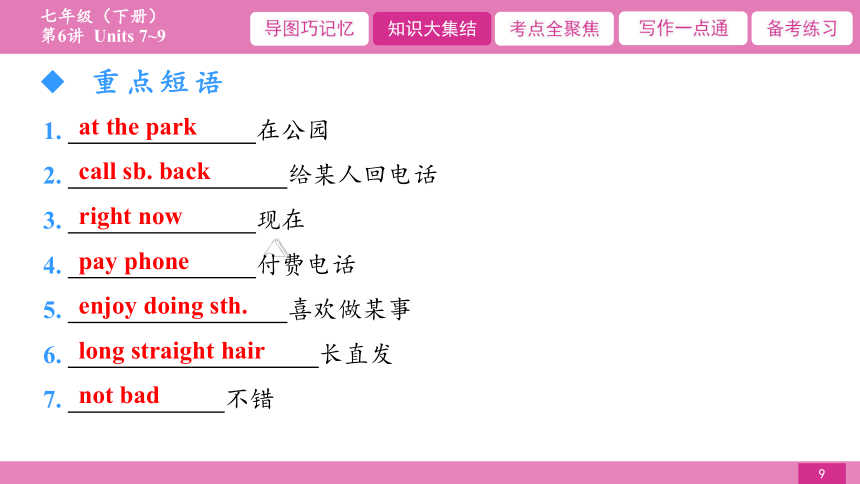
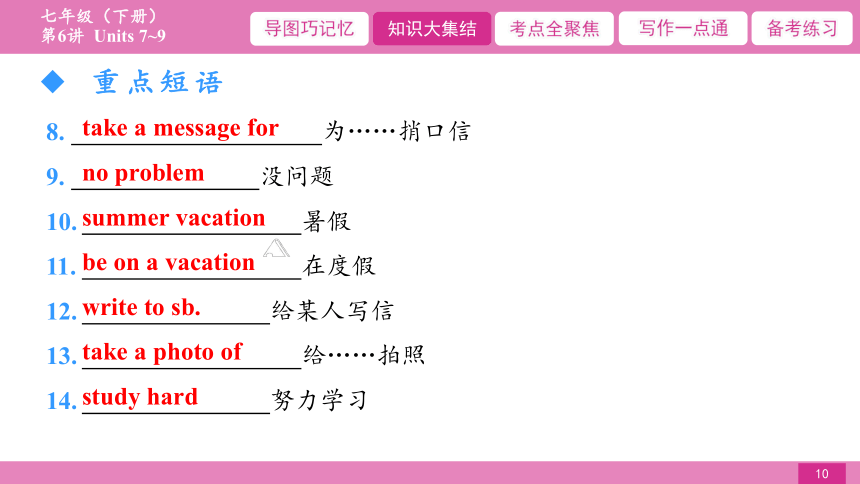
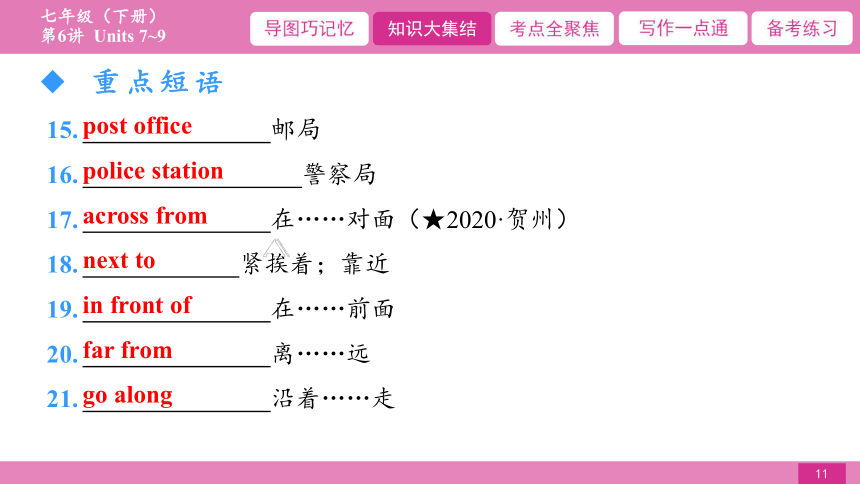
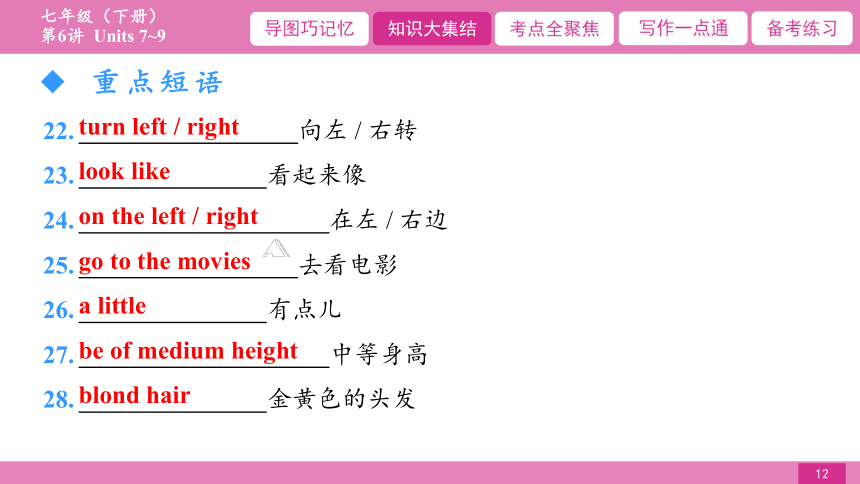
文档简介
第6讲 Units 7~9
第二部分 七年级(下册)
1. rain v. 下雨; n. 雨水→ rainy adj. 阴雨的;多雨的
2. windy adj. 多风的→ wind n. 风
3. cloudy adj. 多云的→ cloud n. 云
4. sunny adj. 晴朗的→ sun n. 太阳
5. snow v. 下雪; n. 雪→ snowy adj. 下雪的
6. him pron. 他(宾格) → he pron. 他(主格)
7. visit v. 拜访;参观→ visitor n. 参观者;访问者
8. Canada n. 加拿大→ Canadian adj. 加拿大的; n. 加拿大人
9. Europe n. 欧洲→ European adj. 欧洲的; n. 欧洲人
10. Russian adj. 俄罗斯的; n. 俄语;俄罗斯人→ Russia n. 俄罗斯
11. north n. 北方; adj. 北方的→ northern adj. 北方的
12. spend v. 花费→ spent(过去式) → spent(过去分词)
13. enjoy v. 享受;喜爱→ enjoyable adj. 令人愉快的
14. easily adv. 容易地→ easy adj. 容易的
15. height n. 高度;身高→ high adj. 高的
16. thin adj. 瘦的→ thinner adj. 较瘦的(比较级) → thinnest adj. 最瘦的(最高级)
17. little adj. 小的→ less adj. 较小的(比较级) → least adj. 最小的(最高级)
18. actor n. 演员→ actress n. 女演员→ act v. 表演
19. person n. 人→ personal adj. 个人的;私人的
20. artist n. 艺术家→ art n. 艺术
21. put v. 放→ put(过去式) → put(过去分词)
22. differently adv. 不同地→ different adj. 不同的
23. real adj. 真正的;真实的→ really adv. 真正地;真实地
1.
在公园
at the park
2.
给某人回电话
call sb. back
3.
现在
right now
4.
付费电话
pay phone
5.
喜欢做某事
enjoy doing sth.
6.
长直发
long straight hair
7.
不错
not bad
8.
为……捎口信
take a message for
9.
没问题
no problem
10.
暑假
summer vacation
11.
在度假
be on a vacation
12.
给某人写信
write to sb.
13.
给……拍照
take a photo of
14.
努力学习
study hard
15.
邮局
post office
16.
警察局
police station
17.
在……对面(★2020·贺州)
across from
18.
紧挨着;靠近
next to
19.
在……前面
in front of
20.
离……远
far from
21.
沿着……走
go along
22.
向左 / 右转
turn left / right
23.
看起来像
look like
24.
在左 / 右边
on the left / right
25.
去看电影
go to the movies
26.
有点儿
a little
27.
中等身高
be of medium height
28.
金黄色的头发
blond hair
29.
戴眼镜
wear glasses
30.
同样的方式
the same way
31.
最后
in the end
32.
首先
first of all
1. —How’s the weather in Beijing?
—It’s sunny. (P37)
——北京天气怎么样?
——晴朗。
2. —Hello, Rick speaking.
—Hi, Rick. It’s Steve. (P38)
——喂,我是里克。
——您好,里克。我是史蒂夫。
3. How’s it going? (P38)
近来可好?
4. —Could you just tell him to call me back?
—Sure, no problem. (P38)
——你能叫他给我回个电话吗?
——当然可以,没问题。
5. I’m having a great time visiting my aunt in Canada. (P41)
我正在加拿大拜访我的姑妈,我玩得很开心。
6. It’s hot in your country now, isn’t it? (P41)
你们国家现在很热,对吗?
7. The weather here is cool and cloudy, just right for walking. (P41)
这里的天气凉爽且多云,正适合散步。
8. —Is there a hospital near here?
—Yes, there is. It’s on Bridge Street. (P43)
——这附近有医院吗?
——有。它在 Bridge 大街上。
9. How can I help you? (P44)
需要我帮忙吗?
10. —Where are the pay phones?
—They’re between the post office and the library. (P45)
——付费电话在哪里?
——它们在邮局和图书馆之间。
11. I like to spend time there on weekends. (P47)
我喜欢在那儿度过周末时光。
12. The best things in life are free! (P47)
生活中最美好的东西是免费的!
13. To get to the park, you just have to cross Center Street. (P47)
要去公园的话,你只要穿过中心街就到了。
14. I may be a little late. (P50)
我可能会晚一点儿。
15. —What does he look like?
—He’s really tall. (P51)
——他长什么样?
——他非常高。
考点1 there be 句型
考点2 指路用语
考点3 询问及描述外貌
考点1 there be 句型。
there be 句型的意思是“有”,表示“人或事物存在于……”。 there 在此结构中是引导词,已经没有副词“那里”的含义。
1. there be 句型结构。
(1)肯定句: There + be +主语+状语. 例如:
There are 50 students in our class. 我们班有50名学生。
(2)否定句: There + be + not +主语+状语. 例如:
There isn’t any water in the glass. 杯子里没有水。
(3)一般疑问句: Be + there +主语+状语?例如:
Are there any apples in the fridge? 冰箱里有苹果吗?
2. there be 句型的就近原则。
there be 句型中,be 的形式与其后的主语保持一致。如果有多个并列主语,则与最接近 be 的主语一致。例如:
There is a pen and two books on the desk. 书桌上有一支钢笔和两本书。
考点2 指路用语。
go along 沿着……走
turn left / right 向左 / 右转
on the left / right 在左 / 右边
next to 紧挨着,靠近
in front of 在……前面
between... and... 在……和……之间
across from 在……对面
考点3 询问及描述外貌。
1. 询问外貌的常用句型:
What do / does +主语+ look like? ……长什么样子?
2. 描述外貌的常用句型:
(1)主语+ is / are +介词短语. 例如:
Our English teacher is of medium height. 我们的英语老师中等身高。
(2)主语+ is / are +形容词(短语). 例如:
Jim is tall and thin. 吉姆又高又瘦。
(3)主语+ have / has +(a / an) +形容词+名词. 例如:
Sally has long curly hair. 萨莉有着一头长卷发。
(4)主语+wear / wears+名词. 例如:
Mary often wears a pair of sunglasses. 玛丽经常戴着一副太阳镜。
介绍家人和朋友
介绍家人和朋友常涉及对他们外表、爱好等的介绍。在写作时,要注意以下几点:
1. 可先从与自己的关系介绍起,再对年龄、职业、外表、爱好等作介绍;
2. 介绍爱好时,可以在平时、周末及假期的活动等方面进行发挥;
3. 可以先总体介绍,再具体讲述,最后抒发感情。
常用句型
1. He / She is... years old.
2. He / She is from...
3. He / She is good at...
4. He / She can...
5. He / She has a round face.
参考范文
Li Ming is a good student in our class and he is my good friend, too.
He is a tall boy of wide interests, especially good at playing football. He is outgoing and always friendly to others. That’s why he has a lot of friends. Li Ming studies hard and of course is one of the top students at school. Besides, he takes an active part in different kinds of activities. He is good at soccer ball. Li Ming is helpful. He always gives his seat to someone in need on the bus.
His actions have won high praise from our school. He sets a good example to us all and we are proud of him.
一、单项选择。
1. —Hello. This is Cindy speaking. Is that Lily?
—Sorry, she isn’t in. .
A. Please hold on.
B. May I take a message?
C. What are you saying to her?
D. I don’t know where she is.
2. Steve enjoys sports because it’s good for his health.
A. do B. does C. doing D. to do
?
?
3. In the UK, the job as a newspaper boy is tiring because of the bags.
A. heavy B. easy
C. free D. real
4. After his tooth is pulled(拔), the man asks the dentist how much he has to_______.
A. take B. pay
C. cost D. get
?
?
5. Just walk down this road and you’ll see the supermarket your left.
A. on B. in
C. at D. by
6. I can’t see the blackboard clearly because a tall boy sits me.
A. near B. next to
C. behind D. in front of
?
?
7. From a tennis player to a successful businessman, Mr. King is always working .
A. soon B. again
C. hard D. often
8. I went to the with Laura last night and the movie was so wonderful.
A. market B. hospital
C. bank D. cinema
?
?
9. In our school library, there two big reading rooms.
A. am B. is
C. are D. be
10. —Are there any competitions in your school?
— We have singing competition and speaking competition every year.
A. Yes, there are. B. No, there aren’t.
C. Yes, they are. D. No, they aren’t.
?
?
二、根据中文或首字母提示,完成单词。
1. This (餐馆) is well-known for its Western food.
2. Molly is a tall girl with long (直的) hair.
3. Every Tuesday afternoon, the students (花费) an hour on club activities.
4. The dress is too large for me. Could you show me (另一) one?
5. Jeff hopes to (爬) the world’s highest mountain, Mount Qomolangma one day.
restaurant
straight
spend
another
climb
6. I had a wonderful time in Sanya and I am looking forward to going there a .
7. My favorite season is s because I can go swimming with my friends.
8. Boys and girls, can you use three words to d your favorite animals?
9. It’s a w day. Many children are flying kites in the park.
10. The dog called Zeus is 2.2 meters tall when he stands on his hind legs(后腿). That’s almost Yao Ming’s h .
gain
ummer
escribe
indy
eight
三、根据句意,用括号内所给单词的正确形式填空。
1. My sister is an actress and (sing).
2. On (sun) days, I always play sports outside and have ice cream.
3. I think you should tell (he) the reason why you are late.
4. Jane is having a great time (visit) her uncle in Australia.
5. You may (easy) become shortsighted (近视的) if you get too close to computer screens.
singer
sunny
him
visiting
easily
四、综合填空。
How do you make small talk with a Briton (英国人)? Here’s a good 1. : talk about weather. According to a survey, weather is the favorite topic in the UK. Britons spend six 2. of their lives talking about rain and sun in a year.
In British culture, this weather talk has two meanings. It could be just a greeting. It could 3. open a new topic when one meets strangers.
way
months
also
real way month remember also
Here’s something to 4. . It’s not good to disagree with a person who is talking about the weather. When someone says, “It’s cold today,” it’s impolite to say, “No, it’s not.” One should always agree no matter what he/she 5. feels.
real way month remember also
remember
really
第二部分 七年级(下册)
1. rain v. 下雨; n. 雨水→ rainy adj. 阴雨的;多雨的
2. windy adj. 多风的→ wind n. 风
3. cloudy adj. 多云的→ cloud n. 云
4. sunny adj. 晴朗的→ sun n. 太阳
5. snow v. 下雪; n. 雪→ snowy adj. 下雪的
6. him pron. 他(宾格) → he pron. 他(主格)
7. visit v. 拜访;参观→ visitor n. 参观者;访问者
8. Canada n. 加拿大→ Canadian adj. 加拿大的; n. 加拿大人
9. Europe n. 欧洲→ European adj. 欧洲的; n. 欧洲人
10. Russian adj. 俄罗斯的; n. 俄语;俄罗斯人→ Russia n. 俄罗斯
11. north n. 北方; adj. 北方的→ northern adj. 北方的
12. spend v. 花费→ spent(过去式) → spent(过去分词)
13. enjoy v. 享受;喜爱→ enjoyable adj. 令人愉快的
14. easily adv. 容易地→ easy adj. 容易的
15. height n. 高度;身高→ high adj. 高的
16. thin adj. 瘦的→ thinner adj. 较瘦的(比较级) → thinnest adj. 最瘦的(最高级)
17. little adj. 小的→ less adj. 较小的(比较级) → least adj. 最小的(最高级)
18. actor n. 演员→ actress n. 女演员→ act v. 表演
19. person n. 人→ personal adj. 个人的;私人的
20. artist n. 艺术家→ art n. 艺术
21. put v. 放→ put(过去式) → put(过去分词)
22. differently adv. 不同地→ different adj. 不同的
23. real adj. 真正的;真实的→ really adv. 真正地;真实地
1.
在公园
at the park
2.
给某人回电话
call sb. back
3.
现在
right now
4.
付费电话
pay phone
5.
喜欢做某事
enjoy doing sth.
6.
长直发
long straight hair
7.
不错
not bad
8.
为……捎口信
take a message for
9.
没问题
no problem
10.
暑假
summer vacation
11.
在度假
be on a vacation
12.
给某人写信
write to sb.
13.
给……拍照
take a photo of
14.
努力学习
study hard
15.
邮局
post office
16.
警察局
police station
17.
在……对面(★2020·贺州)
across from
18.
紧挨着;靠近
next to
19.
在……前面
in front of
20.
离……远
far from
21.
沿着……走
go along
22.
向左 / 右转
turn left / right
23.
看起来像
look like
24.
在左 / 右边
on the left / right
25.
去看电影
go to the movies
26.
有点儿
a little
27.
中等身高
be of medium height
28.
金黄色的头发
blond hair
29.
戴眼镜
wear glasses
30.
同样的方式
the same way
31.
最后
in the end
32.
首先
first of all
1. —How’s the weather in Beijing?
—It’s sunny. (P37)
——北京天气怎么样?
——晴朗。
2. —Hello, Rick speaking.
—Hi, Rick. It’s Steve. (P38)
——喂,我是里克。
——您好,里克。我是史蒂夫。
3. How’s it going? (P38)
近来可好?
4. —Could you just tell him to call me back?
—Sure, no problem. (P38)
——你能叫他给我回个电话吗?
——当然可以,没问题。
5. I’m having a great time visiting my aunt in Canada. (P41)
我正在加拿大拜访我的姑妈,我玩得很开心。
6. It’s hot in your country now, isn’t it? (P41)
你们国家现在很热,对吗?
7. The weather here is cool and cloudy, just right for walking. (P41)
这里的天气凉爽且多云,正适合散步。
8. —Is there a hospital near here?
—Yes, there is. It’s on Bridge Street. (P43)
——这附近有医院吗?
——有。它在 Bridge 大街上。
9. How can I help you? (P44)
需要我帮忙吗?
10. —Where are the pay phones?
—They’re between the post office and the library. (P45)
——付费电话在哪里?
——它们在邮局和图书馆之间。
11. I like to spend time there on weekends. (P47)
我喜欢在那儿度过周末时光。
12. The best things in life are free! (P47)
生活中最美好的东西是免费的!
13. To get to the park, you just have to cross Center Street. (P47)
要去公园的话,你只要穿过中心街就到了。
14. I may be a little late. (P50)
我可能会晚一点儿。
15. —What does he look like?
—He’s really tall. (P51)
——他长什么样?
——他非常高。
考点1 there be 句型
考点2 指路用语
考点3 询问及描述外貌
考点1 there be 句型。
there be 句型的意思是“有”,表示“人或事物存在于……”。 there 在此结构中是引导词,已经没有副词“那里”的含义。
1. there be 句型结构。
(1)肯定句: There + be +主语+状语. 例如:
There are 50 students in our class. 我们班有50名学生。
(2)否定句: There + be + not +主语+状语. 例如:
There isn’t any water in the glass. 杯子里没有水。
(3)一般疑问句: Be + there +主语+状语?例如:
Are there any apples in the fridge? 冰箱里有苹果吗?
2. there be 句型的就近原则。
there be 句型中,be 的形式与其后的主语保持一致。如果有多个并列主语,则与最接近 be 的主语一致。例如:
There is a pen and two books on the desk. 书桌上有一支钢笔和两本书。
考点2 指路用语。
go along 沿着……走
turn left / right 向左 / 右转
on the left / right 在左 / 右边
next to 紧挨着,靠近
in front of 在……前面
between... and... 在……和……之间
across from 在……对面
考点3 询问及描述外貌。
1. 询问外貌的常用句型:
What do / does +主语+ look like? ……长什么样子?
2. 描述外貌的常用句型:
(1)主语+ is / are +介词短语. 例如:
Our English teacher is of medium height. 我们的英语老师中等身高。
(2)主语+ is / are +形容词(短语). 例如:
Jim is tall and thin. 吉姆又高又瘦。
(3)主语+ have / has +(a / an) +形容词+名词. 例如:
Sally has long curly hair. 萨莉有着一头长卷发。
(4)主语+wear / wears+名词. 例如:
Mary often wears a pair of sunglasses. 玛丽经常戴着一副太阳镜。
介绍家人和朋友
介绍家人和朋友常涉及对他们外表、爱好等的介绍。在写作时,要注意以下几点:
1. 可先从与自己的关系介绍起,再对年龄、职业、外表、爱好等作介绍;
2. 介绍爱好时,可以在平时、周末及假期的活动等方面进行发挥;
3. 可以先总体介绍,再具体讲述,最后抒发感情。
常用句型
1. He / She is... years old.
2. He / She is from...
3. He / She is good at...
4. He / She can...
5. He / She has a round face.
参考范文
Li Ming is a good student in our class and he is my good friend, too.
He is a tall boy of wide interests, especially good at playing football. He is outgoing and always friendly to others. That’s why he has a lot of friends. Li Ming studies hard and of course is one of the top students at school. Besides, he takes an active part in different kinds of activities. He is good at soccer ball. Li Ming is helpful. He always gives his seat to someone in need on the bus.
His actions have won high praise from our school. He sets a good example to us all and we are proud of him.
一、单项选择。
1. —Hello. This is Cindy speaking. Is that Lily?
—Sorry, she isn’t in. .
A. Please hold on.
B. May I take a message?
C. What are you saying to her?
D. I don’t know where she is.
2. Steve enjoys sports because it’s good for his health.
A. do B. does C. doing D. to do
?
?
3. In the UK, the job as a newspaper boy is tiring because of the bags.
A. heavy B. easy
C. free D. real
4. After his tooth is pulled(拔), the man asks the dentist how much he has to_______.
A. take B. pay
C. cost D. get
?
?
5. Just walk down this road and you’ll see the supermarket your left.
A. on B. in
C. at D. by
6. I can’t see the blackboard clearly because a tall boy sits me.
A. near B. next to
C. behind D. in front of
?
?
7. From a tennis player to a successful businessman, Mr. King is always working .
A. soon B. again
C. hard D. often
8. I went to the with Laura last night and the movie was so wonderful.
A. market B. hospital
C. bank D. cinema
?
?
9. In our school library, there two big reading rooms.
A. am B. is
C. are D. be
10. —Are there any competitions in your school?
— We have singing competition and speaking competition every year.
A. Yes, there are. B. No, there aren’t.
C. Yes, they are. D. No, they aren’t.
?
?
二、根据中文或首字母提示,完成单词。
1. This (餐馆) is well-known for its Western food.
2. Molly is a tall girl with long (直的) hair.
3. Every Tuesday afternoon, the students (花费) an hour on club activities.
4. The dress is too large for me. Could you show me (另一) one?
5. Jeff hopes to (爬) the world’s highest mountain, Mount Qomolangma one day.
restaurant
straight
spend
another
climb
6. I had a wonderful time in Sanya and I am looking forward to going there a .
7. My favorite season is s because I can go swimming with my friends.
8. Boys and girls, can you use three words to d your favorite animals?
9. It’s a w day. Many children are flying kites in the park.
10. The dog called Zeus is 2.2 meters tall when he stands on his hind legs(后腿). That’s almost Yao Ming’s h .
gain
ummer
escribe
indy
eight
三、根据句意,用括号内所给单词的正确形式填空。
1. My sister is an actress and (sing).
2. On (sun) days, I always play sports outside and have ice cream.
3. I think you should tell (he) the reason why you are late.
4. Jane is having a great time (visit) her uncle in Australia.
5. You may (easy) become shortsighted (近视的) if you get too close to computer screens.
singer
sunny
him
visiting
easily
四、综合填空。
How do you make small talk with a Briton (英国人)? Here’s a good 1. : talk about weather. According to a survey, weather is the favorite topic in the UK. Britons spend six 2. of their lives talking about rain and sun in a year.
In British culture, this weather talk has two meanings. It could be just a greeting. It could 3. open a new topic when one meets strangers.
way
months
also
real way month remember also
Here’s something to 4. . It’s not good to disagree with a person who is talking about the weather. When someone says, “It’s cold today,” it’s impolite to say, “No, it’s not.” One should always agree no matter what he/she 5. feels.
real way month remember also
remember
really
